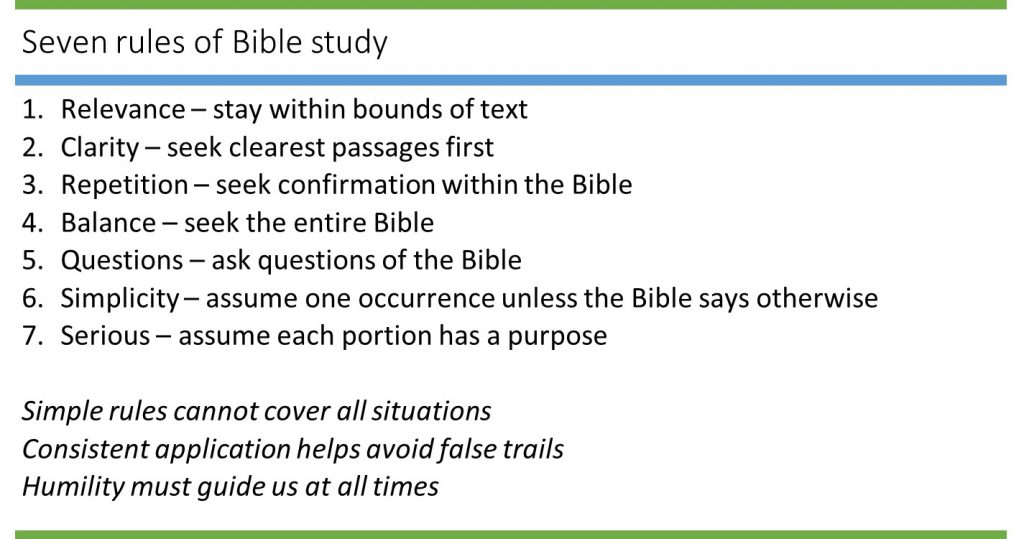Hermeneutics
The power of the Careful Bible Student comes from God’s word. We cannot take credit for anything of our own minds. At best, we can mimic the teaching of Jesus, his apostles and the prophets of the Old Testament.
Key ingredient
We tap into the Lord’s wisdom by carefully studying the Bible with humility. The Careful Bible Student doesn’t make strong statements without the firm foundation of God’s word – clear, confirmed and
Process of analysis
Interpretation involves more than a best guess after a quick reading of a verse. It requires a process of integration which I apply based on systems engineering. This process first breaks up a passage into its component pieces, looks for confirmation of each statement and then builds the pieces into a structure (usually a conceptual model) which most closely resembles the original message in the Bible.
This process can often surprise us with new revelations that don’t appear from a casual reading of the text but always agree with the text. The Careful Bible Student avoids new revelations that don’t come directly from multiple places in the Bible.
Like most processes, we need the humility to rise and repeat from time to time. A Careful Bible Student can correct an unknown error by repeating his/her analysis from time to time. We might learn something new from a fresh approach to a topic or passage.
Things to avoid
God doesn’t have contradictions in His word. I believe that God presents the most important things with simplicity and clarity. For example, God says, “Do not murder.” The Careful Bible Student learns how to balance that statement with His commands to execute murderers and His permission (and directives) to wage war. God expects His people to become wise, not naïve. Resist foolish children who claim to have “caught God in a lie” because the interpret the Bible using their own knowledge, understanding and definitions.
I’m not a big fan of context-based hermeneutics. Generalizations of context usually contain the seeds of the misinterpretation they spawn. Some passages resist identification of context since they jump freely from one topic to another without warning or direction. Old Testament prophets often fall into this pattern. The book of Proverbs is a classic example of the difficulties of context. Determining context requires multiple analyses of a passage and balance with other biblical passages. The proper context usually comes last to our understanding, not first.
Careful Bible Students need to remain aware of the type of biblical literature that they are reading. Poetry uses various forms of imagery to teach God’s truth. We should ensure that we have an confirmation from a narrative form of literature before taking the elements from these passages literally. Based on this realization, I avoid the debate of literal vs. figurative as unnecessary if we approach the Bible using a different method.
Best rules
Careful Bible Students use seven “rules” (i.e. hermeneutics) to guide our analysis of the Bible:
- Relevance – we must remain within the boundaries of each passage. Avoid stretching a verse just to make some personal point. If it’s true, you should be able to find a clear statement of the truth elsewhere in the Bible.
- Clarity – start with the clearest statements in the Bible before going to vague verses. God doesn’t mince His words or mumble truth. He speaks with clarity and power. Expect the same from those who claim to speak for Him by looking for His clear teachings.
- Repetition – every truth is confirmed by two or three witnesses. Truth will always appear multiple times in the Bible guided by clarity and relevance.
- Balance – must always search the Bible from Genesis to Revelation for answers. Don’t depend on a single phrase from one place. God’s truth has balancing aspects to prevent His people from becoming mindless radicals.
- Questions – ask questions whenever analyzing the Bible. Never question God’s character, but ask why He says something and why He says it this way, etc. Contrast one passage against another to learn about both.
- Simplicity – the simple answer is usually the best. If the Bible doesn’t say, assume a single event or person. Don’t overthink the plumbing. Less is more when interpreting the Bible. If God wants us to know something, He will say it and repeat it so that we are without excuse.
- Serious – every passage, verse & word has a divine purpose. We must never do anything which diminishes or negates God’s word.

Realize that no simple set of rules can produce perfect interpretations every time. We must remain consistent in our application of these rules while reviewing ourselves from time to time to ensure that we remain within Christian doctrine. Mostly, we must remain humble as we approach God’s word. Our pride always take us astray no matter what other safeguards we implement.